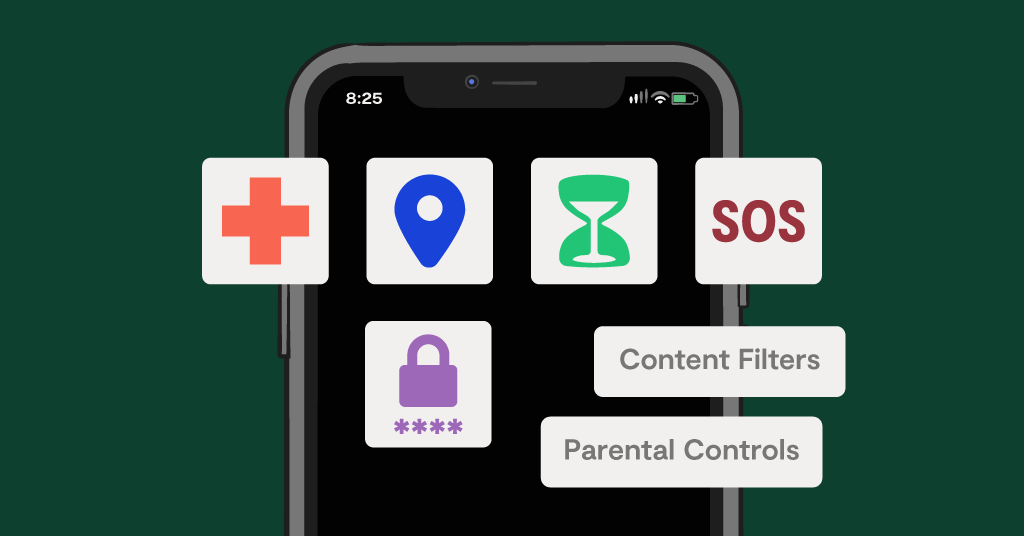
**This blog post was updated on August 8, 2024.**
Key takeaways from this blog post:
- Kids sending nudes can lead to serious legal and emotional consequences, including criminal charges and psychological harm.
- It's important to educate your child about the risks and legal implications of sharing explicit content.
- Open, non-judgmental conversations about digital boundaries and online safety are crucial.
- Monitoring and setting clear guidelines for online behavior can help prevent such issues.
- Seeking professional help and resources is important if a child is involved in sending or receiving inappropriate content.
What Are Nudes and Could Your Child Be Sharing Them?
If you're new to the parenting in a tech world community, you may find yourself wondering "What are nudes?" Whether you’ve discovered that your child is sending nudes or you just want to be prepared in case it happens, you can probably guess that it’s a complicated situation to deal with. When we were growing up, creating and sharing naked photos wasn’t really a thing (unless someone had a Polaroid, and even then, they couldn’t be shared instantly).
But things have changed. According to a report published in JAMA Pediatrics, 1 in 4 kids will admit to sexting. 24/7 access to devices — along with surging hormones and intense peer pressure — have all contributed to the rise of sexting with today’s generation of teens and tweens. Chances are, your kids will at least have a friend that is sending or receiving them, even if they don’t. They may even receive unsolicited nude photos, which is a form of sexual harassment that can provoke a range of negative psychological effects, including stress, anxiety, shame, and — since online activities often spill into the real world — even fear for their physical safety.
We know all families are different and possess unique values when it comes to sexual content. This blog post aims to help you have productive conversations with your child while also providing some insight into the world kids live in today.
Understand the Pressures Kids Face Associated with Sending Nudes
It was only a matter of time before sexting and sending nudes would become a common (but still risky) activity for kids. Nearly a decade ago, an article revealed that “sexting is the new first base,” identifying a social trend that is still common in the halls of middle and high schools across the country. Sending, receiving, and asking for nudes has become the first step in many romantic and sexual advances.
Think about this for a second — regardless of whether a kid ever wants to send or receive nudes, they’re going to be judged or compared for their decision according to the social attitudes of their fellow students. This is incredibly stressful (and unfair). To help put things into perspective, talk to your child about times you felt pressured when you were in high school.
- Conversation Starter: “We may not have had smartphones and social media when we were in school, but people were always pressuring us to do more than we were comfortable with. I just wanted you to know that I understand how that feels in case there’s ever anything you want to talk about.”
Ask Them If They Think All Messages Are Truly Private
Your child may think that the person they’re sending photos to would never do anything malicious with them — and maybe they wouldn’t. But what’s completely unpredictable is who else might also be able to access their phone and what it contains.
A parent could be spot-checking it at the end of the night. A friend could grab their phone for a prank and stumble across them. If they lost their phone, it could end up in the hands of a total stranger. In some cases, kids even create “revenge porn,” intentionally and maliciously sharing explicit content with their entire social circles (and beyond) when relationships take a turn for the worst.
Because this content is digital, it can be sent to almost anyone on the planet with just a few taps on the screen. There’s also the possibility that screenshots could be taken and shared to other devices, further creating a situation where control of your content is completely lost.
- Conversation Starter: “Do you know anyone whose pictures were shared without their permission? How did that happen? Are you worried that it could happen to you?”
Have “The Talk” — And Keep Having It
For our generation, “The Talk” referred to the birds-and-the-bees conversation we had with our parents, and it was meant to explain the basics of human sexuality — or at the very least, where babies come from. It tended to be a one-and-done discussion. Today, because of just how complex technology has made the process of growing up, we recommend having ongoing “Talks” with your kids — especially when it comes to sexual content. It’s not exactly easy, but it’s super important.
When they’re of the appropriate age, talk to your kids about sexting and the consequences of sending nudes: how to recognize it and what to do if they encounter it. Make sure they know they can always come to you and talk about what’s happening in their life. Discuss your family’s stance on the subject of sexting and what you expect of them. Stress that you know the pressures they’re facing.
- Conversation Starter: “As you get older, you’re going to have new experiences with sexual content, and I just wanted to remind you of our family values on that subject. But let’s also check in every once in a while to make sure we’re on the same page.”
Discuss the Legal Consequences of Sending Nudes
Naked pictures of minors are illegal and can be considered child sexual abuse material (CSAM) — even if it’s two children willingly exchanging them. Sexting laws vary from state to state, and they can be hard to understand, so it’s important to do some research and know where your state stands on the issue. Some jurisdictions have “Romeo and Juliet” provisions, which lessen the severity of the offense when the parties involved are similar in age.
- Conversion Starter: "What do you think might happen if you send nudes? Do you think it's something that would get you in trouble with the police?"
Monitor for Possible Issues
Odds are, unless you’ve discovered firsthand that your kid has encountered sexual content online, they’re probably not going to tell you about it — whether from embarrassment, shame, fear, confusion, or just a desire to keep it secret. Bark’s award-winning service enables you to monitor for sexual content in your child’s texts, email, YouTube account, and 30+ of the most popular social media platforms and apps. And when you get a Bark alert, it’s more than just a notification. It also comes with recommended actions you can take to learn more about the issue and support your child in the most effective way.
The possibility of your child sending nudes can be a stressful reality to face, but we hope this blog post has helped you understand why they might be engaging in this behavior. Also, by discussing with them the potential dangers and consequences of sexting, it may help them understand that you have only their best interests at heart.
Read more
Bark helps families manage and protect their children’s digital lives.






